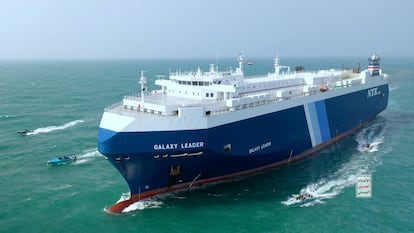Red Sea crisis drives Somali pirates into the Indian Ocean
Ship boardings have risen since November due to disrupted maritime traffic from Houthi attacks off the coast of Yemen

On March 15, an Indian navy destroyer in the Arabian Sea used a drone to confirm armed men had hijacked the MV Ruen bulk carrier. A 40-hour counterattack was launched involving a patrol ship, a drone, reconnaissance aircraft and Indian army commandos. The hijackers surrendered, freeing the Maltese-flagged ship and its crew.
The MV Ruen was seized by Somali pirates, not combatants from Yemen. The notorious pirates once active off the coast of Somalia have resurfaced in the Arabian Sea to exploit rerouted Red Sea maritime traffic due to recent Houthi assaults on commercial vessels. Their new area of operation also avoids an increased military presence in the Red Sea. Three large merchant ships have been attacked in recent months and one is still held by pirates. In all, 18 smaller ships have come under attack and Somali pirates are still in command of seven. According to the European Union’s Atalanta anti-piracy naval operation based in Cádiz, Spain, several ships have reported suspicious activity and hijacking attempts. Operation Atalanta only has one vessel at its disposal — Victoria, a Spanish frigate.
Houthi attacks in the southern Red Sea, which handled 15% of global maritime traffic, forced major shipping companies to reroute ships around Africa as trade through the region plummeted by 60% year-over-year. Navigation through the Bab el-Mandeb strait between Yemen and Djibouti dropped precipitously as shipping traffic routed around the Cape of Good Hope surged by 90%, according to PortWatch, a maritime trade monitoring platform.
Many experts believe that Somali pirates no longer pose a threat as they did over a decade ago. Their peak in 2011 was countered by an international maritime force, ship security measures, and tenacious pursuit of pirates. As piracy became less profitable, they turned to other activities. However, their return amid the Red Sea crisis has raised concerns. “Ever since the Houthis began attacking ships in the Red Sea, cases of piracy have shot up significantly,” said Shekhar Sinha, a former Indian navy vice admiral who commanded naval forces in the Arabian Sea from 2012-2014. “Piracy was completely under control before the Houthis started attacking.”
India has mobilized the most to curb piracy, boasting the largest naval presence in the Arabian Sea
Experts and monitoring groups believe there are up to four organized pirate groups currently operating out of the Somali state of Puntland, which includes the Horn of Africa’s strategic tip. Known for its fishing tradition, this region has been heavily affected by Somalia’s prolonged civil war and foreign companies that have overfished the waters. Political instability in Puntland has also increased recently, possibly contributing to the resurgence of pirate networks.
Borer Louis, of the Risk Intelligence maritime security risk consultancy, says there are two main types of pirate attacks: assaults on illegal fishing near the Somali coast and hijackings of merchant ships in deeper waters (not seen since 2017). The first type is carried out by small groups of fishermen, while hijacking attempts usually involve organized and experienced pirates who are often linked to local armed groups. They are more sophisticated and use previously hijacked mother ships with advanced weapons and navigation systems. Operation Atalanta has recently identified several pirate camps on the Somali coast where captured ships are held during ransom negotiations.
The Indian response
India has mobilized the most to curb piracy, boasting the largest naval presence in the Arabian Sea. “New Delhi is demonstrating its commitment to regional stability by aligning with its new security partners and deploying resources for restoring order,” said Mohammed Soliman of the Middle East Institute.
Raj Mohabeer of the Indian Ocean Commission, an intergovernmental organization that links the island nations of the southwestern Indian Ocean, acknowledges concerns about rising levels of piracy. “[Now] we have to monitor the situation and see if what the Indians are doing is really enough to stop new attacks.”
Jakob Larsen, security director at BIMCO, a major shipowners association, believes the key to resolving the situation lies in enhancing self-defense capabilities on ships, enforcing maritime law with warships, and prosecuting attackers. “Pirates roaming the seas always worry sailors and shipowners.”
Sign up for our weekly newsletter to get more English-language news coverage from EL PAÍS USA Edition
Tu suscripción se está usando en otro dispositivo
¿Quieres añadir otro usuario a tu suscripción?
Si continúas leyendo en este dispositivo, no se podrá leer en el otro.
FlechaTu suscripción se está usando en otro dispositivo y solo puedes acceder a EL PAÍS desde un dispositivo a la vez.
Si quieres compartir tu cuenta, cambia tu suscripción a la modalidad Premium, así podrás añadir otro usuario. Cada uno accederá con su propia cuenta de email, lo que os permitirá personalizar vuestra experiencia en EL PAÍS.
¿Tienes una suscripción de empresa? Accede aquí para contratar más cuentas.
En el caso de no saber quién está usando tu cuenta, te recomendamos cambiar tu contraseña aquí.
Si decides continuar compartiendo tu cuenta, este mensaje se mostrará en tu dispositivo y en el de la otra persona que está usando tu cuenta de forma indefinida, afectando a tu experiencia de lectura. Puedes consultar aquí los términos y condiciones de la suscripción digital.









































